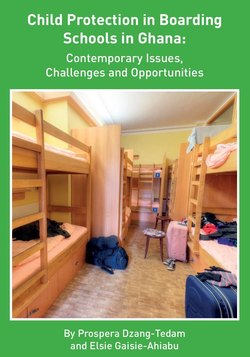Читать книгу Child Protection in Boarding Schools in Ghana - Prospera Dzang-Tedam - Страница 8
На сайте Литреса книга снята с продажи.
ОглавлениеPART TWO:Setting the Context
Chapter 1Introduction
Education is essential for everyone and it is the level of education that helps people earn respect, recognition and expand their world view. However, the general standard of education between men and women the world over is still a major challenge that needs to be addressed. There are disparities between boys’ and girls’ educational attainment at all levels, with girls reported to have lower enrolment, poorer retention and achievement rates than boys, especially as they progress to senior high schools and tertiary levels in many developing countries (MDG Report 2015). The importance of promoting female education for achieving sustainable development is now widely recognised and it is imperative that this is embraced by all.
According to the 2010 Population and Housing Census, females constitute more than fifty one percent of the entire Ghanaian population, therefore education should be a prerequisite for them to be able to significantly contribute to the development aspirations of Ghana. However, in their efforts to move higher to attain their ambitions they are faced with a wide range of challenges such as psychological, emotional, financial and social needs. These numerous challenges make them vulnerable, requiring additional levels of support, guidance and advice to motivate young girls achieve their potential (Unterhalter, 2013).
It has been the case that senior secondary education in Ghana is largely delivered through boarding provision for young people aged from about 15-18 years (although in many cases children can be younger or older). Boarding schools in Ghana come in a variety of forms and can be single gender or mixed genders; secular or faith-based; government or private; large, medium or small. They can also be in rural, urban or peri-urban (on the outskirts of an urban area) sites, requiring significant travel for many children and young people. This diversity makes it difficult to achieve any standardised or systematic approach to protecting and safeguarding children and young people in these situations. For example, a faith-based secondary school may include religious programmes in their curricula and extra-curricular timetable. They may also have different ways of disciplining children and of engaging with their families.
According to Ajayi (2013), there are approximately 700 secondary schools in Ghana, however not all offer boarding provision.
As a response to some of the above challenges, the authors came together to design and implement a project in a Girls Senior High School (a government-assisted school) following approval from the Ministry of Education and cooperation from the school management in 2014. The Sunflower Project was aimed at enhancing the attainment of girls through the provision of social work services in schools. This was the first of its kind in Ghana and yielded benefits for the girls in the project school. The project offered the services of an onsite qualified social worker who provided various forms of support to the girls such as: signposting, advice and guidance within the school. Areas of intervention included: online safety, protective behaviour work, negotiating financial support, home-school liaison, anti-bullying strategies and groupwork.
These areas of intervention and others will be discussed in depth later in the book. We will outline the development of the project from inception to implementation and examine the strengths of the project and challenges faced during the pilot phase. The aim will be to share cultural and other factors which were considered in the development of this project and to highlight key areas where culturally-relevant approaches to social work intervention were used. An examination of child protection and welfare from a Ghanaian perspective will be highlighted and good practice shared.
The authors argue in this book that social work has a place in secondary schools more generally and in boarding secondary schools in particular. To emphasise this point, we subscribe to the following definition of child protection recently used by the Ministry of Gender, Children and Social Protection. It states that:
“Child Protection seeks to guarantee the right of all children to a life free from violence, abuse, exploitation and neglect. The many actors engaged in child protection include children and youth, families, communities, government, civil society and private organisations.” (MoGCSP, 2014: iv).
Such a definition in our view commits staff and leadership at boarding secondary schools to actively promote and support the rights of children whilst ensuring abuse, in all its forms and in all areas of a child’s life is disrupted and eliminated.
Learning checks
What have you learned from this chapter?
What did you know before?
